Hosea 3 meaning explained in AI Summary
Hosea chapter 3 continues the prophet's personal story, which serves as a powerful metaphor for God's relationship with Israel.
1. A Command to Love Again (vv. 1-3): God instructs Hosea to once again demonstrate his love for his adulterous wife, Gomer. This time, however, there's a twist. He's to love her despite her continued unfaithfulness and potential involvement with another man. This act symbolizes God's unwavering love for Israel, even though they have repeatedly turned away from Him to worship other gods.
2. A Period of Waiting and Reflection (vv. 4-5): Hosea's love is demonstrated through a period of separation and waiting. Gomer is to live without the security and comfort of a husband, mirroring the consequences Israel will face for their idolatry. This period symbolizes a time of exile and hardship for the Israelites, forcing them to reflect on their actions and yearn for God's return.
3. A Promise of Restoration and Hope (vv. 5): Despite the punishment and separation, the chapter ends with a glimmer of hope. It promises that after a time, Israel will return to God, seeking His leadership and love. This return signifies repentance and a renewed covenant between God and His people.
Key Themes:
- God's Unconditional Love: Despite Israel's repeated unfaithfulness, God's love remains constant and unwavering.
- Consequences of Sin: Idolatry and turning away from God have severe consequences, symbolized by Gomer's hardship and Israel's exile.
- Hope for Restoration: Even in judgment, there is hope for repentance, forgiveness, and a restored relationship with God.
Overall, Hosea chapter 3 is a powerful reminder of God's enduring love and the possibility of redemption, even after repeated failures. It highlights the seriousness of turning away from God while offering a message of hope and restoration for those who return to Him.
Hosea 3 bible study ai commentary
Hosea 3 is a profound living parable illustrating God's relentless, redeeming love for His unfaithful people. It encapsulates the core gospel message of redemption, discipline, and final restoration. Through the painful personal command for Hosea to buy back his adulterous wife, God demonstrates the cost of His covenant faithfulness to a spiritually adulterous Israel, foretelling a period of exile and separation, followed by a future Messianic age where His people will return to Him in reverence and receive His goodness.
Hosea 3 Context
This chapter is set in the turbulent 8th century BC in the Northern Kingdom of Israel (Ephraim). Politically, the nation was declining towards its eventual destruction by Assyria (722 BC). Spiritually, Israel was deeply entrenched in syncretism, particularly the worship of Baal, the Canaanite storm and fertility god. Religious prostitution was a common feature of these fertility cults. Hosea’s marriage to an unfaithful woman, Gomer, serves as the central, divinely-ordained metaphor for Yahweh’s covenant relationship with an Israel that had “prostituted” itself by turning to other gods and foreign alliances.
Hosea 3:1
And the LORD said to me, “Go again, love a woman who is loved by another man and is an adulteress, even as the LORD loves the children of Israel, though they turn to other gods and love cakes of raisins.”
In-depth-analysis
- "Go again, love a woman": This is the second major command regarding Hosea's marriage (the first being in Hos 1:2). The emphasis is on
’ahav(love), a deliberate, active, and loyal love, not mere emotion. It mirrors God's covenant love. - "loved by another man": Lit. "a friend" or "a companion." It highlights her current relationship; she belongs to someone else. This points to Israel's allegiances to other nations and gods.
- "adulteress" (
mena’epet): Confirms her ongoing, willful unfaithfulness. She is not a victim but an active participant in breaking the covenant. - "even as the LORD loves...": This is the key to the entire chapter. Hosea’s personal agony is a direct illustration of God’s divine pathos and unwavering love for His people.
- "cakes of raisins": These were likely used in pagan fertility rites, possibly offered as treats during festivals for Baal or other idols. It signifies the cheap, temporary pleasures Israel preferred over the deep, covenantal relationship with Yahweh.
Bible references
- Jer 3:1: "If a man divorces his wife ... and she becomes another man's, will he return to her again?... But you have played the harlot with many lovers; yet return to Me," says the LORD. (Explicit parallel of God calling back His unfaithful 'wife').
- Rom 5:8: "...but God shows his love for us in that while we were still sinners, Christ died for us." (God's love for the undeserving).
- Eph 5:25: "Husbands, love your wives, as Christ loved the church and gave himself up for her..." (Christ's redeeming love for His bride).
- Deut 7:7-8: "It was not because you were more in number ... but because the LORD loves you and is keeping the oath that he swore to your fathers..." (The basis of God's love is His own character and promise).
Cross references
Jer 2:20-25 (Israel's spiritual adultery); Ezek 16:15-34 (Detailed allegory of Jerusalem's unfaithfulness); Deut 31:16 (Prophecy of Israel's future idolatry).
Polemics
The command directly confronts the Baal cult. By having Hosea act out God's love and redemption, Yahweh demonstrates that He, not Baal, is the true husband of Israel and the source of all blessing. The "cakes of raisins," products of the land, were seen as gifts from Baal; God reclaims them as items connected to apostasy. Yahweh shows His love is superior, as it is based on covenant fidelity, not the capricious, transactional nature of pagan worship.
Hosea 3:2
So I bought her for myself for fifteen shekels of silver and a homer and a lethech of barley.
In-depth-analysis
- "I bought her for myself": The Hebrew verb
karahmeans to acquire or buy, often by trade or covenant. This is a transaction of redemption. He is not buying a new wife, but legally re-acquiring his own who has become enslaved by her sin. - "fifteen shekels of silver": This is half the standard price for a female slave (30 shekels, see Ex 21:32). This could signify her degraded value in her state of sin, or that this was a partial payment.
- "a homer and a lethech of barley": A homer was about 220 liters, and a lethech was half a homer. So, he paid with 1.5 homers of barley. Barley was a common staple, less valuable than wheat. The total price (silver plus the likely value of the barley) probably adds up to the 30 shekels of a common slave.
- The price is humiliating. He pays the price of a common slave for his own wife, demonstrating the depth of her fall and the great cost of her redemption. It highlights that sin enslaves.
Bible references
- Ex 21:32: "If the ox gores a male or female servant, the owner shall give to their master thirty shekels of silver..." (The standard price of a slave).
- 1 Pet 1:18-19: "...knowing that you were ransomed ... not with perishable things such as silver or gold, but with the precious blood of Christ..." (The ultimate redemption price).
- Ruth 4:10: "...Ruth the Moabite, the wife of Mahlon, I have bought to be my wife..." (Boaz as a kinsman-redeemer buying back what was lost).
- Gal 3:13: "Christ redeemed us from the curse of the law by becoming a curse for us..." (The act and cost of redemption).
Cross references
Lev 27:4 (Valuation of a female); Matt 26:15 (Thirty pieces of silver for betraying Jesus); 1 Cor 6:20 (Bought with a price).
Hosea 3:3
And I said to her, “You must dwell as mine for many days. You shall not play the harlot, or belong to another man; so will I also be to you.”
In-depth-analysis
- "dwell as mine for many days": This is a period of probation and separation. It is not immediate restoration to full marital intimacy, but a time of healing and re-establishing the covenant foundation.
- "many days" (
yamim rabbim): An indefinite but significant period of time. - "not play the harlot, or belong to another": A command for absolute fidelity. Her exclusive loyalty must be to Hosea, her redeemer. This addresses the root sin.
- "so will I also be to you": Hosea pledges reciprocal faithfulness. He too will be set apart for her, refraining from normal marital relations during this period. This mirrors God's "waiting" for Israel. God withdraws His manifest presence and blessings but remains covenantly bound.
Bible references
- Deut 24:1-4: "he writes her a certificate of divorce... She may go and become another man's wife... her former husband, who sent her away, may not take her again to be his wife..." (Hosea's action is an act of grace that goes beyond the Law).
- Lev 21:7, 13-14: "They shall not marry a prostitute..." (Hosea's marriage itself defies standard priestly holiness rules to make a greater point).
- 1 Cor 7:10-11: "...If she does, she should remain unmarried or else be reconciled to her husband..." (Points to the value of reconciliation over permanent separation).
- 2 Tim 2:13: "if we are faithless, he remains faithful—for he cannot deny himself." (God's unwavering faithfulness, even in the face of our unfaithfulness).
Cross references
Heb 12:5-11 (God's loving discipline); Jer 3:1 (God's offer of reconciliation against the law); Rev 2:5 (Call to repentance and return to first love).
Hosea 3:4
For the children of Israel shall dwell many days without king or prince, without sacrifice or sacred pillar, and without ephod or household gods.
In-depth-analysis
- This verse directly applies the preceding parable to the nation of Israel.
- "without king or prince": Israel will lose its political structure, national leadership, and sovereignty. This was fulfilled in the Assyrian (for Israel) and Babylonian (for Judah) exiles.
- "without sacrifice or sacred pillar": They will lose their religious structures, both legitimate (
sacrifice) and illegitimate (sacred pillarormatstsevah, associated with Canaanite worship). All religious activity, true and false, will cease. - "without ephod or household gods": They will lose the means of discerning divine will, both legitimate (the ephod, used by the high priest) and illegitimate (
teraphim, or household idols used for divination). - This verse describes a total stripping away of Israel's identity—political, social, and religious. It's a forced state of isolation where they cannot rely on their political leaders or their religious rituals (both true and syncretic) to save them. This state of emptiness is designed to make them ready to turn back to the one true God.
Bible references
- Deut 4:27-28: "And the Lord will scatter you among the peoples... And there you will serve gods of wood and stone... which neither see nor hear nor eat nor smell." (Prophecy of exile and impotent idolatry).
- Dan 9:27: "...he shall make a strong covenant with many for one week, and for half of the week he shall put an end to sacrifice and offering." (Prophetic period of suspended Temple worship).
- Luke 21:24: "they will fall by the edge of the sword and be led captive among all nations, and Jerusalem will be trampled underfoot by the Gentiles, until the times of the Gentiles are fulfilled." (Describes the long period of desolation).
Cross references
1 Sam 28:6 (Saul without divine guidance); Isa 6:11-13 (Land becoming a desolation); Lam 2:9 (Her king and princes are among the nations).
Hosea 3:5
Afterward the children of Israel shall return and seek the LORD their God, and David their king, and they shall come in fear to the LORD and to his goodness in the latter days.
In-depth-analysis
- "Afterward": This follows the "many days" of discipline. It is a promise of future restoration.
- "return and seek": This describes
teshuvah—repentance. It is an active turning back to God. - "the LORD their God, and David their king": The dual objects of their seeking. They will return to true worship of Yahweh and to their rightful, God-ordained leadership under the Davidic covenant. This is a messianic prophecy. "David their king" points to the Messiah, a future son of David who would reign forever.
- "come in fear": The Hebrew
pachadsuggests trembling or awesome reverence. They will approach God not with arrogance but with profound awe at His holiness and grace. - "his goodness" (
tuv): The sum of all His blessings—spiritual and physical provision, security, and favor. - "in the latter days" (
be'aharit hayyamim): A standard eschatological term referring to the final period of God's redemptive plan, the Messianic Age.
Bible references
- Jer 30:9: "But they shall serve the LORD their God and David their king, whom I will raise up for them." (An almost identical prophecy of restoration).
- Acts 2:30-32: "Being therefore a prophet... he foresaw and spoke about the resurrection of the Christ... This Jesus God raised up..." (Peter identifies Jesus as the fulfillment of the Davidic covenant).
- Luke 1:32-33: "He will be great... and the Lord God will give to him the throne of his father David, and he will reign over the house of Jacob forever..." (Gabriel's promise to Mary about Jesus).
- Mic 7:18-20: "Who is a God like you, pardoning iniquity... You will show faithfulness to Jacob and steadfast love to Abraham..." (Celebrates God's covenant-keeping love and faithfulness that leads to restoration).
Cross references
Zec 12:10 (Future repentance of Israel); Ezek 34:23-24 (Promise of the shepherd "David"); Jer 50:4-5 (Seeking the LORD in the last days); Isa 2:2-3 ("in the latter days" nations will come to the Lord).
Hosea chapter 3 analysis
- Redemption's Cost and Humiliation: The price Hosea pays for Gomer, equivalent to that of a common slave, poignantly illustrates the devalued state of God's people due to sin and the humbling cost of their redemption. This foreshadows the humiliation of Christ (Phil 2:6-8) in His redemptive work.
- Chiastic Structure: The chapter has a beautiful poetic structure focusing on the central point (v. 3):
- A. God’s Command for Hosea's Redeeming Love (v. 1)
- B. Hosea's Act of Redemption (the price paid) (v. 2)
- C. The Condition: Period of Separation and Discipline (v. 3)
- B'. The Result: Israel's Period Without King or Worship (v. 4)
- B. Hosea's Act of Redemption (the price paid) (v. 2)
- A'. God's Final Redeeming Love and Israel's Return (v. 5)
- A. God’s Command for Hosea's Redeeming Love (v. 1)
- Discipline as an act of Love: The "many days" of isolation for Gomer (v. 3) and for Israel (v. 4) are not purely punitive. They are a necessary period of separation designed to break the cycle of addiction to idolatry and prepare the heart for true reconciliation. This reframes divine discipline as a tool of restorative grace.
Hosea 3 summary
God commands Hosea to redeem his unfaithful wife from her life of adultery, paying the price of a slave. This dramatic personal act symbolizes God's own covenant love for Israel. He imposes a period of rehabilitative separation on her, which parallels a prophesied future era where Israel will exist without political leadership or religious ceremony. The chapter concludes with the ultimate promise that "in the latter days," Israel will repent, seek both the LORD and "David their king" (the Messiah), and be restored to a relationship of awesome reverence and divine goodness.
Hosea 3 AI Image Audio and Video
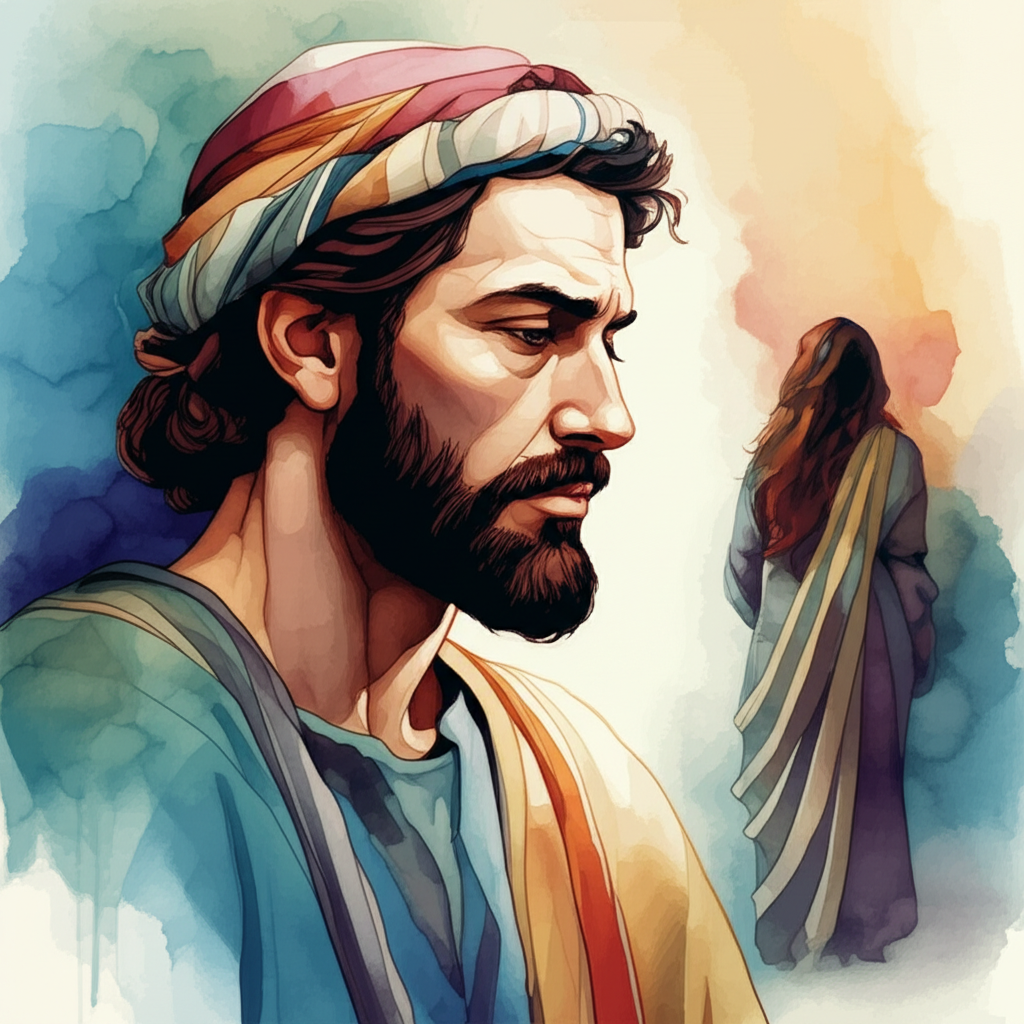
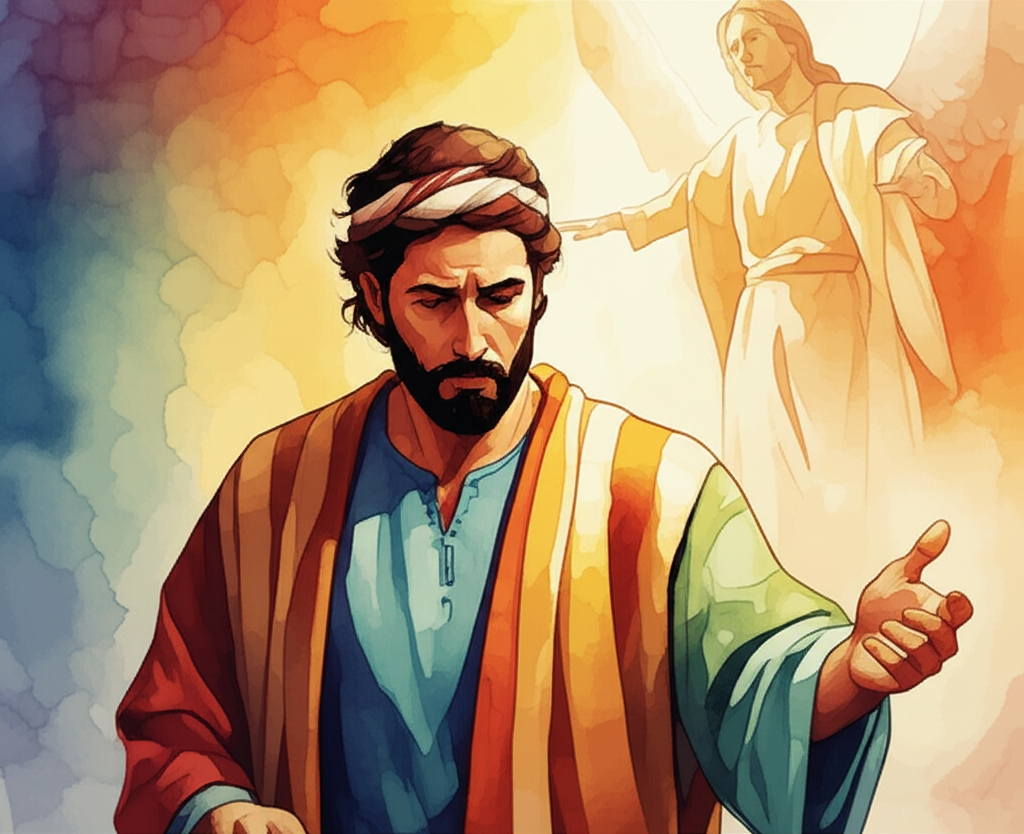
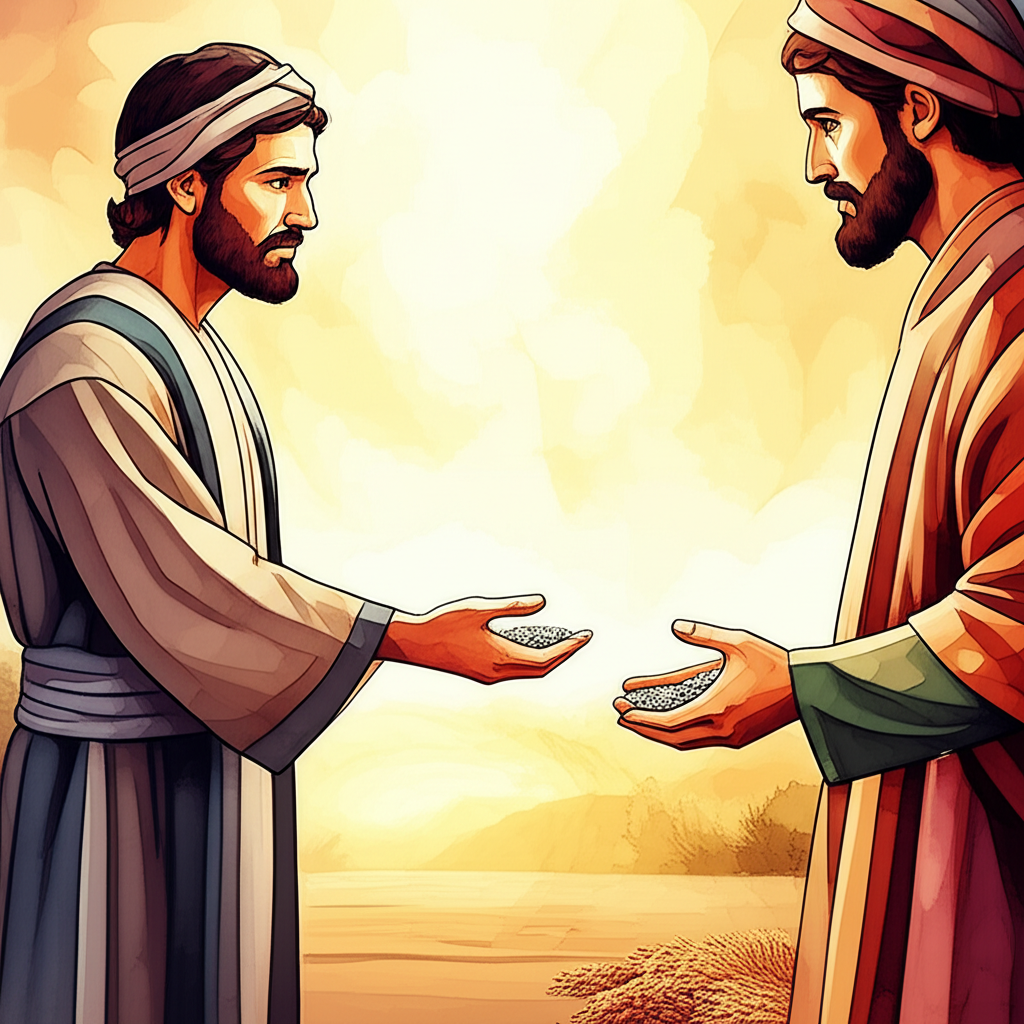


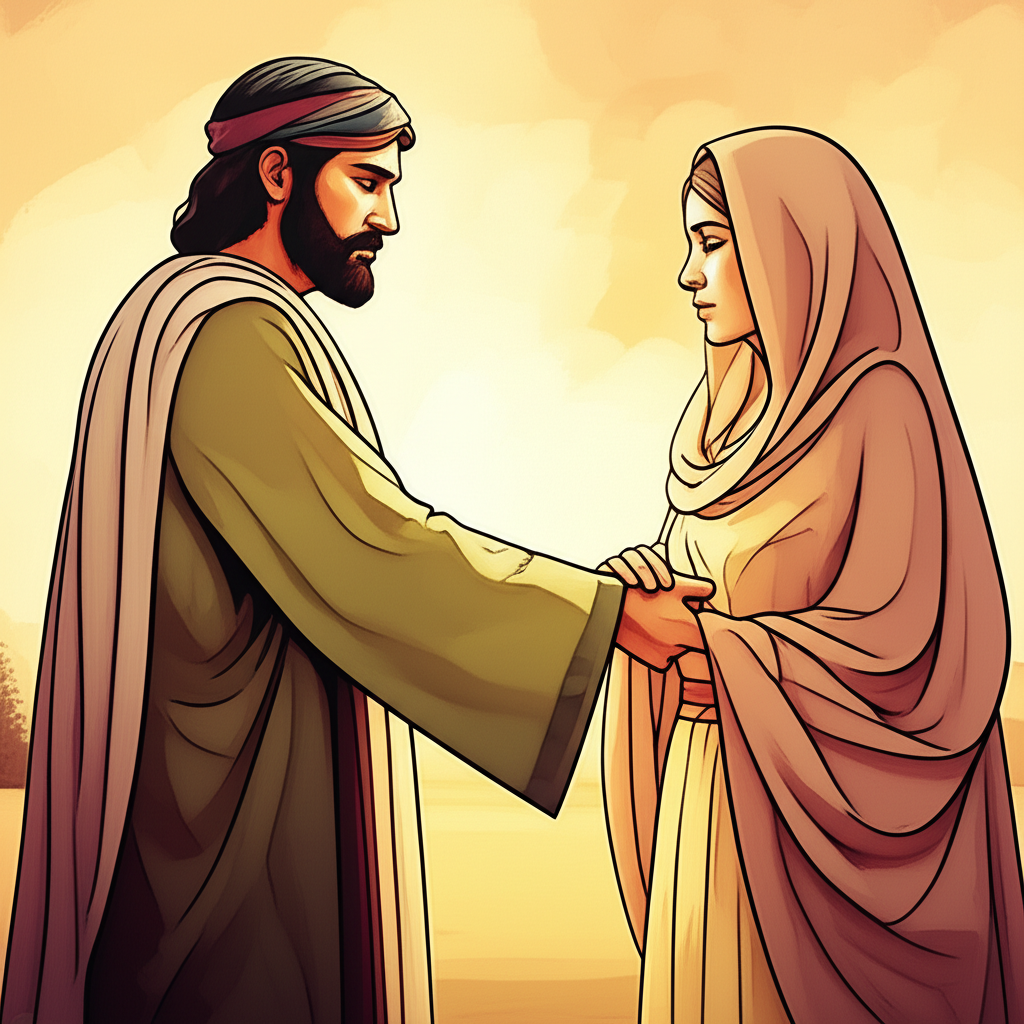


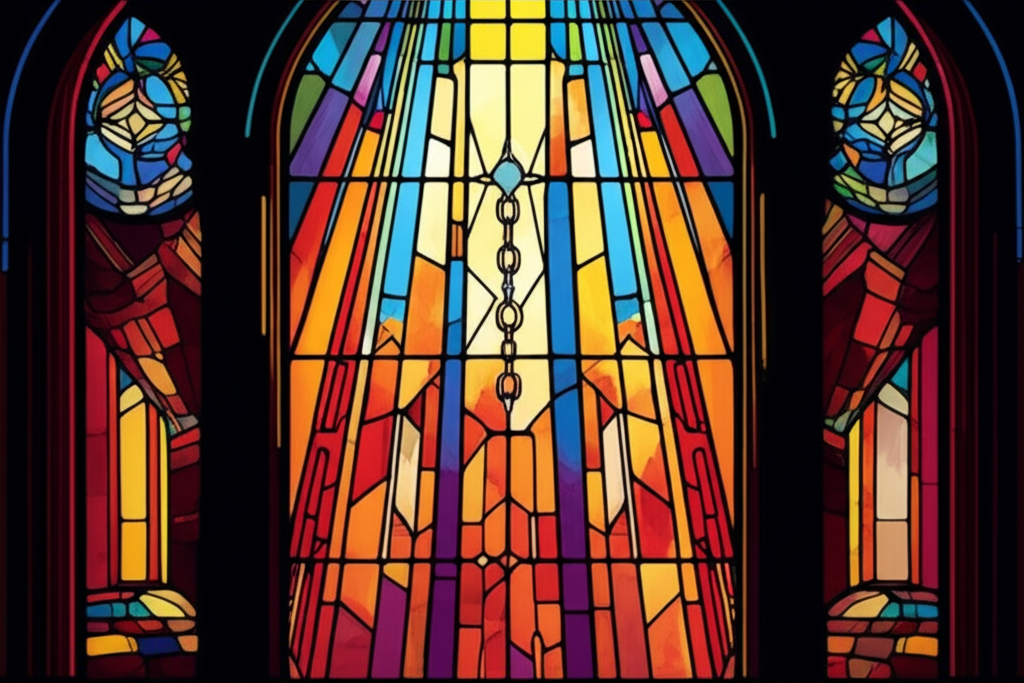
Hosea chapter 3 kjv
- 1 Then said the LORD unto me, Go yet, love a woman beloved of her friend, yet an adulteress, according to the love of the LORD toward the children of Israel, who look to other gods, and love flagons of wine.
- 2 So I bought her to me for fifteen pieces of silver, and for an homer of barley, and an half homer of barley:
- 3 And I said unto her, Thou shalt abide for me many days; thou shalt not play the harlot, and thou shalt not be for another man: so will I also be for thee.
- 4 For the children of Israel shall abide many days without a king, and without a prince, and without a sacrifice, and without an image, and without an ephod, and without teraphim:
- 5 Afterward shall the children of Israel return, and seek the LORD their God, and David their king; and shall fear the LORD and his goodness in the latter days.
Hosea chapter 3 nkjv
- 1 Then the LORD said to me, "Go again, love a woman who is loved by a lover and is committing adultery, just like the love of the LORD for the children of Israel, who look to other gods and love the raisin cakes of the pagans."
- 2 So I bought her for myself for fifteen shekels of silver, and one and one-half homers of barley.
- 3 And I said to her, "You shall stay with me many days; you shall not play the harlot, nor shall you have a man?so, too, will I be toward you."
- 4 For the children of Israel shall abide many days without king or prince, without sacrifice or sacred pillar, without ephod or teraphim.
- 5 Afterward the children of Israel shall return and seek the LORD their God and David their king. They shall fear the LORD and His goodness in the latter days.
Hosea chapter 3 niv
- 1 The LORD said to me, "Go, show your love to your wife again, though she is loved by another man and is an adulteress. Love her as the LORD loves the Israelites, though they turn to other gods and love the sacred raisin cakes."
- 2 So I bought her for fifteen shekels of silver and about a homer and a lethek of barley.
- 3 Then I told her, "You are to live with me many days; you must not be a prostitute or be intimate with any man, and I will behave the same way toward you."
- 4 For the Israelites will live many days without king or prince, without sacrifice or sacred stones, without ephod or household gods.
- 5 Afterward the Israelites will return and seek the LORD their God and David their king. They will come trembling to the LORD and to his blessings in the last days.
Hosea chapter 3 esv
- 1 And the LORD said to me, "Go again, love a woman who is loved by another man and is an adulteress, even as the LORD loves the children of Israel, though they turn to other gods and love cakes of raisins."
- 2 So I bought her for fifteen shekels of silver and a homer and a lethech of barley.
- 3 And I said to her, "You must dwell as mine for many days. You shall not play the whore, or belong to another man; so will I also be to you."
- 4 For the children of Israel shall dwell many days without king or prince, without sacrifice or pillar, without ephod or household gods.
- 5 Afterward the children of Israel shall return and seek the LORD their God, and David their king, and they shall come in fear to the LORD and to his goodness in the latter days.
Hosea chapter 3 nlt
- 1 Then the LORD said to me, "Go and love your wife again, even though she commits adultery with another lover. This will illustrate that the LORD still loves Israel, even though the people have turned to other gods and love to worship them. "
- 2 So I bought her back for fifteen pieces of silver and five bushels of barley and a measure of wine.
- 3 Then I said to her, "You must live in my house for many days and stop your prostitution. During this time, you will not have sexual relations with anyone, not even with me. "
- 4 This shows that Israel will go a long time without a king or prince, and without sacrifices, sacred pillars, priests, or even idols!
- 5 But afterward the people will return and devote themselves to the LORD their God and to David's descendant, their king. In the last days, they will tremble in awe of the LORD and of his goodness.
- Bible Book of Hosea
- 1 Hosea's Wife and Children
- 2 Israel's Unfaithfulness Punished
- 3 Hosea Redeems His Wife
- 4 The Lord Accuses Israel
- 5 Punishment Coming for Israel and Judah
- 6 Israel and Judah Are Unrepentant
- 7 When I would heal Israel, the iniquity of Ephraim is revealed, and the evil
- 8 Israel Will Reap the Whirlwind
- 9 The Lord Will Punish Israel
- 10 Israel is a luxuriant vine that yields its fruit. The more his fruit increased,
- 11 The Lord's Love for Israel
- 12 The Lord's Indictment of Israel and Judah
- 13 The Lord's Relentless Judgment on Israel
- 14 A Plea to Return to the Lord